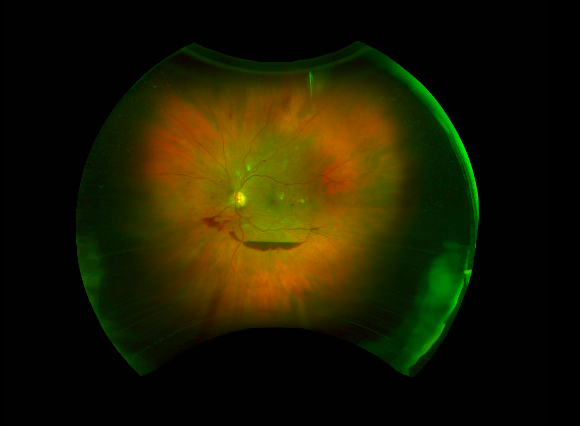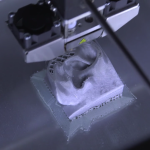Ophthalmologists around the world, including Mass. Eye and Ear retina surgeons, are exploring ways that artificial intelligence can fight eye disease.
In just about every corner of medicine, doctors are exploring ways that artificial intelligence (AI) — and especially new, more precise “deep learning” algorithms — can be used to improve health care.
The use of AI in ophthalmology took a step forward this past April, when a device was approved by the Food and Drug Administration to detect signs of diabetic retinopathy (damage to the retina as a complication of diabetes). This is the first approval of a diagnostic device of its kind to review fundus photographs, or images taken of the back of the eye. By reviewing the photographs, the device indicates a “yes” or “no” decision on whether a patient has diabetic retinopathy.

For many eye specialists, the hope is that this is only the beginning of how AI could improve eye health around the world.
John B. Miller, MD, Director of Retinal Imaging at Mass. Eye and Ear, recently co-authored an article in Retina Today about just this topic. Dr. Miller leads a team studying the use of AI in patient care and research on diseases of the retina.
We checked in with Dr. Miller about the article and AI, and he offered three ways that AI could help doctors fight eye disease in the future:
Making eye disease screening much easier and more accessible
Imagine walking into your local pharmacy, and next to the blood pressure machines, there is a device that can take photos of your eyes. Perhaps, minutes later, that device could tell you whether you should see an eye specialist for signs of eye disease.
AI technology that can automate screenings (like the device approved for diabetic retinopathy detection) allows us to imagine this scenario.
“The best delivery of health care is to bring the access points closer to the patient,” Dr. Miller said. “The ability to screen in a setting that’s easier for patients to reach could mean catching something earlier.”
Reaching more patients around the world through telemedicine
Dr. Miller adds that AI also has the potential to transform the field of telemedicine. With telemedicine, doctors can consult with patients in remote areas using virtual technology.
By using algorithms to screen for eye disease, providers can reach many more patients through telemedicine — bringing eye consultation to areas without access to ophthalmology.
Processing images faster and more efficiently for research, leading to new knowledge
Researchers have traditionally sifted through thousands of clinical images, manually, sitting at a computer.
Imagine an AI platform that can process many more — and in a shorter amount of time than a researcher could. The faster processing time could bring research advances sooner.
“We could potentially identify more specific phenotypes of disease through recognition with an AI system,” Dr. Miller said.
For example, as a retina specialist, Dr. Miller is researching age-related macular degeneration (AMD). There’s not much known about the early stages of AMD, and patients are often not diagnosed until more advanced stages. This is because the signs and symptoms of the condition are very subtle. It’s also difficult to tell if a patient’s disease will progress or not.
Dr. Miller’s lab is processing images of patients with all stages of AMD, looking for signs and associations between photographs of patients whose disease worsened.
Through the use of AI, the lab could potentially process many more images than they could without the technology.
“That’s something we’re currently working on,” Dr. Miller said. “AI will hopefully help us to catapult beyond what we’re currently doing in prognostic information for the patient.”
About Our Expert
 Dr. John Miller is Director of Retinal Imaging at Massachusetts Eye and Ear, where he maintains an active research program in addition to a clinical retina practice. He sees patients at Mass. Eye and Ear’s 243 Charles Street and Longwood locations.
Dr. John Miller is Director of Retinal Imaging at Massachusetts Eye and Ear, where he maintains an active research program in addition to a clinical retina practice. He sees patients at Mass. Eye and Ear’s 243 Charles Street and Longwood locations.




During my annual eye exam this week, I was told that I have early signs of Macular Degeneration.
I have a new and young Optometrist ( who replaced my long standing Optometrist) that I don’t I don’t have a lot of faith in.
She told me to come back in a year for another exam.
How can I be proactive if I truly have these early sx’s and is it advisable to seek another opinion.
Thank you.
My hope is that there may be som cure for AMD. Mine is advancing ;my life will never be the same.